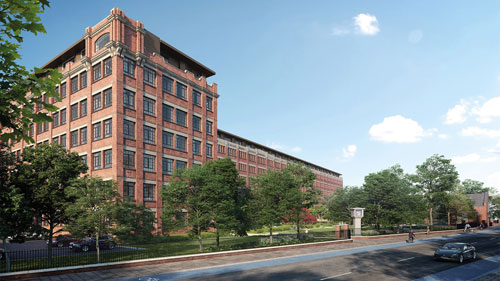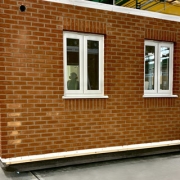Rise of timber driven by carbon reduction and improving building performance
High performance timber windows and doors manufacturer, NorDan UK Ltd, has announced a record 34 percent increase in turnover for a single year for 2022.
NorDan’s turnover has increased year-on-year since 2016 and has grown more than 85 percent in the last five years.
Sustained growth across private and public customers is further evidence of changing priorities in the construction industry, with an increasing focus now on the whole life carbon reduction of buildings and the lengthening the lifespan of products and materials.
Originally conceived to withstand the harsh rigours of a Nordic maritime winter, NorDan’s timber and aluminum-clad timber windows and doors have been known as a niche product, offering some of the industry’s highest standards in thermal performance and durability.
But with architects and specifiers now seeking materials that meet the changing demands of developers and housebuilders, NorDan’s products are now becoming a mainstream in UK building.
This is being heavily influenced by the Future Homes Standard (set to come into force in 2025), with numerous big social landlords and local authorities already specifying and building to that standard – including the likes of NorDan customers Reading Council and Clarion Housing Group.
The sale of timber products has also been driven by an increasing need to reduce whole life carbon of buildings, including the embodied carbon emissions generated from the manufacture, transport, installation, and eventual disposal of building materials.
NorDan is one of the few construction suppliers that has Environmental Product Declarations (or EPDs) on virtually its entire product range, proving third-party validated audits of all the carbon in its products.

Alex Brown, NorDan UK Managing Director said: “Last year’s record growth is obviously very pleasing, but 100% consistent with the wider direction of travel in construction and the built environment.
“People have long known that NorDan’s timber products are carbon negative and offer a 60-year lifespan but have maybe in the past needed a reason to specify what were perceived premium windows or doors.
“What we now see is low carbon, durability, and high-thermal performance becoming the new mainstream, and this is taking NorDan’s and other quality timber products with it.
“Architects and developers are now seeking incremental gains across buildings to meet raising industry standards, as well as the expectations of the public, and NorDan can give them the low-carbon, high-performance guarantees sought.
Alex concludes: “Looking ahead, NorDan UK’s priority is to continue developing its people and infrastructure to maintain anticipated accelerated growth over the coming years.”
Mat Clarke, Contracts Manager at contractor Henry Boot Construction comments:
“Sustainability, and reducing the whole life carbon impact of building, has become an increasing priority for Henry Boot Construction in recent years, and we now routinely seek out sustainable suppliers and partners.
“As a result, we are increasing the amount of timber we use in our construction projects, and this has made NorDan a natural choice, as it places sustainability at the heart of its operations and products.
Mat continues: “A recent example of this can be found at our marquee development at The Cocoa Works in York, where NorDan’s products have the specification to achieve a high environmental and energy performance.”
Ayo Allu, Director of Design, Technical & Innovation at NorDan customer Clarion Housing Group comments:
“Material costs and the impact of embodied carbon calculations on business performance is increasingly driving the way Clarion is constructing its buildings, as is our familiarity with the timber products on the market, and the vast increase in testing data compared to previous years.
“Embodied carbon is already a development consideration within major cities, and the GLA how has an embodied carbon tool which has to be completed for each new development – with other cities set to follow suit.”
Ayo concludes: “As a development business, we’re now benchmarking our embodied carbon for development and construction activities for the second year running, so we can set reduction targets for ourselves and our supply chain.”

Both Henry Boot Construction and Clarion Housing Group are working with NorDan on the iconic Cocoa Works refurbishment project in York.
NorDan UK is the British arm of the Norwegian founded NorDan Group, a multinational business that operates in seven European countries, employing 2,200 people across 12 factories and 35 sales offices.
For more information PLEASE CLICK HERE
For more information on the Cocoa Works, York, PLEASE CLICK HERE





